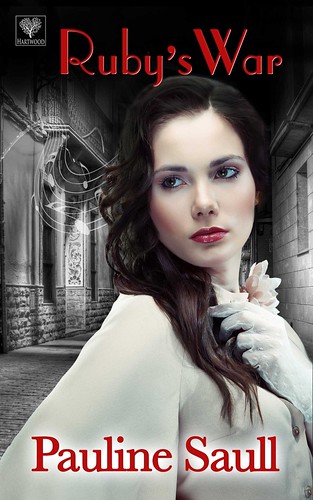Cover & Excerpt Reveal
by Pauline Saull
 Can love survive the separation of war? Ruby Cohen and Erich Lehman believe so.
Can love survive the separation of war? Ruby Cohen and Erich Lehman believe so.Ruby, a talented pianist, is sent to England for her own safety by a caring benefactor. Erich, an architectural student, is sent by his father, but not for his safety. His father harbors evil intentions and needs Erich out of the way to achieve them.
The pair meet at Hamburg station, and on the journey to London, love blossoms. But due to unforeseen circumstances, they are separated.
For six long years, Ruby and Eric struggle to find each other again amidst the storms of war. Throughout other loves, sorrows, and tribulations, the memory of their bond is never forgotten.
A twist of fate brings Ruby and Erich back together in Germany at the end of the war. Both have pasts they would rather not share…can their love survive the scars Fate has dealt while they were apart?
Genre: Historical Romance
Content/Theme(s): Musician, Architect, War, WWII
Release Date: November 6, 2014
Publisher: Hartwood Publishing

Excerpt & More
Purchase links: Amazon ARe Smashwords Kobo B&NExcerpt:
July 1939, Hamburg, Germany
The Laeiszhalle
As Ruby Cohen sounded the final note in the first movement of Brahms’s Piano Concerto No. 2, a feeling of exhilaration coursed through her. In the ensuing brief, intense silence, she thought it possible that if one her hairpins dropped to the floor, it would be heard. Holding her breath, she waited, her gaze riveted on the conductor until Max Fiedler, with a slight bow and large smile in her direction, slowly lowered his baton to rapturous applause, not only from the audience, but the orchestra too joined in.
On shaky legs, one hand on the piano for support, Ruby rose to take repeated bows. That she had played the piece well enough, not only to please Herr Fiedler but also the members of his beloved Hamburg Philharmonic, was praise indeed.
When the applause died down and the conductor signaled the start of the next piece, Ruby’s thoughts drifted, her one desire now to be alone in her room indulging in the pleasure of replaying every note again in her head.
At the end of the concert, the hall began emptying slowly; players collecting their sheet music shuffled around on the stage noisily, discussing the concert—their own performances, the audience reaction—but Ruby had no wish to join in. Her pleasure was to be savored later. Hurrying to the small cloakroom backstage to collect her coat, she thrust her arms into it, grabbed her bag, and made her way down the gloomy corridor toward the exit. Almost at the door, she stopped with a start of surprise. Fraulein Berta, the maestro’s assistant, stepped from the shadows, her aged face tight with anxiety.
“Herr Fiedler wishes to speak with you,” she whispered urgently. “Come quickly, we were afraid we might miss you. It is important.”
“What?” Ruby’s heartbeat quickened. “Have I offended him?”
Berta shook her head and didn’t speak again, just pulled her along the narrow passageway past members of the orchestra on their way out, some of whom turned to watch the young pianist and Berta with open interest. At the far end of the corridor, after a quick glance over her shoulder, Berta stopped, tapped on the maestro’s door, and entered. Ruby followed.
“My dear child.” Max Fiedler rose from his chair with seeming difficulty. “Come, sit here. Close the door, Berta.”
Ruby’s heart pounded. Never had the maestro asked to speak with her alone before; it had always been with other members of the philharmonic milling around. Tonight, even though he smiled, the expression in his eyes, which she had become quite adept at reading, was serious.
Seated in the chair indicated, waiting for Herr Fiedler to sit, Ruby noticed how heavily he relied on Berta to help him.
Catching her watching, he smiled. “Old bones,” he said.
Adjusting his glasses, he pulled on one side of his long gray moustache with a sigh before speaking. “Ah, you played the Brahms wonderfully well tonight, my dear girl. But then, I think you know that already.”
Ruby, breathless with relief that a rebuke was not forthcoming, briefly inclined her head. “Thank you.”
He nodded, his steady gaze holding hers. “There is something we, or should I say I, have been meaning to speak with you about for some time now.” He leaned forward, his face somber. “There is a difficult situation developing in our beloved homeland over which I fear we will have no control…none at all. It saddens me greatly, and because I’m old, frightens me too, so reluctantly I have decided to take certain steps. You must be aware of the changes taking place in Hamburg?”
“I have seen the newspapers, Herr Fiedler.”
“Then you will know the position for Jews is not good.”
Ruby nodded and then frowned. “Yes, I am aware of this, but I am a female and of no political persuasion, so it has not concerned me greatly.”
“Ah my child, if only that were all you had to worry about, I would not have felt the need to bring up this matter. But I’m afraid political leanings are not what interest our new leader and his followers. It is all entirely about race, and we dare not voice opinions. I shall get straight to the point. I will reach my eightieth birthday this year and want to spend what is left of my life in peace.” He placed his hand over Berta’s on his shoulder. “So Berta and I are leaving for Stockholm very shortly and will not return.”
A gasp of dismay escaped Ruby; this was the man who had urged and encouraged her, pulled from her the latent talent she didn’t know she possessed, and now he was leaving.
“But… But…” She stopped; tears had thickened her voice.
Herr Fiedler sighed heavily. Leaning across, he patted her hand before opening a drawer in his desk to take out a thick brown envelope. “It is a surprise, and I can see you regard it as bad news, but all is not lost, my dear. I discovered the British government has decided to ease restrictions for certain categories of Jewish refugees, and as an artist, luckily you fit the requirements. I saw it as a wonderful opportunity for you, one not to be missed. You see, they have opened a camp for just such people as yourself at a place called…” He studied a piece of paper from the envelope. “Ah, yes, Richborough in Kent, England.”
“Refugees… I don’t understand.” What is he saying?
He appeared not to have heard her, handing over the envelope. “Because I am concerned for your safety, I took the liberty of making certain arrangements. In there you will find a temporary travel visa along with tickets for your journey to Britain. Also I have included a letter from me introducing you to Adrian Boult, the conductor of the BBC Symphony Orchestra in London…and there is money, enabling you to live fairly comfortably for some time.”
Ruby frowned and looked at the envelope in her hands. “I…I am to leave Germany for a while?”
Max Fiedler had looked up at that question. Now he looked away. “It is for the best,” he said firmly. “I’m sad to say that I feel it will become impossible for you stay here at all, Ruby. You may be politically unaware, but unfortunately you are Jewish, which makes Berta and I feel the sooner you leave Germany, for at least the time it takes this situation to blow over, the better. Happily I had many contacts enabling me to obtain the necessary papers for you quickly. After tonight we shall not meet again.” A small, sad smile creased his face. “All that remains now is for me to wish you the very best of luck, my child.”
And with that he waved a dismissive hand and turned back to his desk. Berta half pulled a dazed Ruby to the door, opened it, and waited until she’d crossed the threshold. “Good luck,” she said. The door clicked shut in Ruby’s face.
That evening in her room, an attic above a tailor’s shop, all thoughts of savoring moments from the concert gone from her head, Ruby took out the battered leather suitcase that had belonged to her parents. Josef Cohen’s name could still be seen faintly on the inside of the lid. It had been the only thing remaining from her parents’ holiday in the Black Forest where both had died nine months previously. The true circumstances of their demise had never been clearly defined, yet as the months passed, Ruby quickly put her own interpretation on the facts given to her.
Mother dead in bed by strangulation; father at her side, his body full of arsenic.
She stared through the small, high window to the black, starless night and dismissed any further thoughts of them. It was the past. She had the future to deal with.
Leaving Germany, along with the uncertainty of what lay ahead, frightened and appalled her. How, she wondered, could she possibly survive alone in such an alien place as England? She could not speak the language, knew practically nothing of the island’s customs or people, only that they were considered lazy and oafish—an insular race of inbreeds if rumors were to be believed.
Opening the brown envelope, Ruby studied the contents; a first class ticket for a train leaving Hamburg, one for the ferry from Holland to Harwich, and in a smaller envelope, money and a short note from Herr Fiedler explaining the reichmarks were for immediate living expenses until she left, and his assurance that the two English five pound notes would be ample for food plus fares on the bus journeys to London and Kent.
Running a finger over his spidery writing, Ruby stifled a sob. He and Berta were the two kindest souls she had ever encountered in her seventeen years, and many times had counted herself extraordinarily lucky to have met them; their combined encouragement and efforts resulting in her ensuing success never ceasing to fill her with gratitude.
She sank down on her narrow bed, recalling how it had all started quite by chance. Suddenly finding herself with money from the sale of her parents’ small flat, the urge to learn to play the piano had unexpectedly overcome Ruby. Berta, a woman she knew through her job as salesgirl at the musical shop, gave lessons there once a week, and Ruby had shyly approached her requesting a lesson.
Berta had considered this. “It is enough that I have three pupils. I only do this because I always harbor the hope of one day discovering a budding talent, but,” she took one of Ruby’s hands, studied it, nodded, “some say long fingers are not needed. I believe they are. You can pay for an hour, and we’ll see how you fare.”
At the end of an hour of scales and rudimentary practice, Berta sat back, arms folded, and asked Ruby if she could read music.
“A little, only from a failed attempt at the guitar once.” Ruby had stared at the sheet, touched fingers to keys, and played the short piece without hesitation. The music came naturally to her, and she played as though she had been taking lessons for years.
“Yes,” she said, turning to Berta in amazement.
And that was the start. Many hours of practicing, and finally an introduction to Herr Fiedler followed. Ruby’s career as a concert pianist was launched.
And so this was the end. Now she would surely never see either of them again.
The thought struck with such force, her throat tightened, making it hard to breathe.
She had to leave her homeland—everything she knew and was familiar with, and for what?
Because you are a Jew!
Those had been Herr Fiedler’s words. A man with contacts who had seen danger and wanted her gone. Ruby crossed to the small mirror and leaned closer.
There was no mistaking the look. Thick black hair and brows, dark brown eyes—and turning her face slightly—why had she never noticed before? That slightly arched nose.
With a heavy heart and little enthusiasm, she opened drawers and started sorting out her meager belongings. Now she knew she must leave, there didn’t seem any point hanging around. The sooner it was done, the better.
All she’d be taking with her would have to fit into the small brown suitcase.
In the morning she would clear out food and rubbish, ensure all windows were secure, lock the front door, and walk away, the key in her pocket. That way, should there be any change in circumstances, she would be on the first train back, a home still to come to.
~~~~~~
Purchase links: Amazon ARe Smashwords Kobo B&N
Other titles by Pauline Saull:
In Paradise |
Affair |
 |
 |
Twitter: @PaulineSaull
Pauline Saull on Amazon
More Pauline Saull on Cover Reveals
Interested in this book? Let your friends and family know about it. Use the buttons below to share this post with them.

No comments:
Post a Comment
All comments are moderated so it may take a while for the comments to appear on the page.